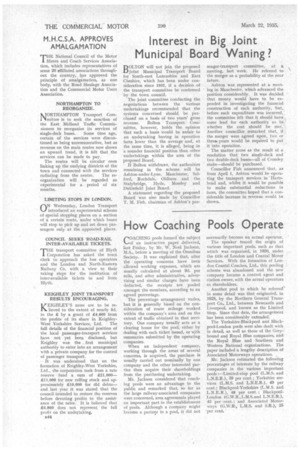How Coaching Pools Operate
Page 58

If you've noticed an error in this article please click here to report it so we can fix it.
COACHING pools formed the subject of an instructive paper delivered, last Friday, by Mr. W. Noel Jackson, M.A., before a meeting of the Omnibus Society. It was explained that, after the operating concerns have been allowed working expenses, which are usually calculated at about 9d. per mile, and after administrative, advertising and similar charges have been deducted, the receipts are pooled amongst the members, according to an agreed percentage.
The percentage arrangement varies, but it is generally based on the consideration of route mileage worked within the company's area and on the extent of traffic obtained in that territory. One company usually acts as a clearing house for the pool, either by dealing with each ticket issued, or with summaries submitted by the operating companies.
When an independent company, working through the areas of several concerns, is acquired, the purchase is usually carried out nominally by one company and the other interested parties then acquire their shareholdings from the purchasing undertaking.
Mr. Jackson considered that coaching pools were an advantage to the public and remarked that, so far as the large railway-associated companies were concerned, area agreements played an important part in the establishment of pools. Although a company might become a partner in a pool, it did not necessarily become an actual operator.
The speaker traced the origin of various important pools, such as that which was organized, in 1920, under the title of London and Coastal Motor Services. With the formation of London Coastal Coaches, Ltd., this pooling scheme was abandoned and the new company became a control agent and station owner, with the actual operators as shareholders.
Another pool to which he referred" in some detail was that originated, in 1928, by the Northern General Transport Co., Ltd., between Newcastle and Liverpool, and known as the Limited Stop. Since that date, the arrangement has been considerably extended: The Yorkshire-Blackpool and Blackpool-London pools were also dealt with in detail, as well as those of the Greyhound and Royal Blue companies, and the Royal Blue and Southern and Western National organizations. The paper included a lengthy description of Associated Motorways operations.
Mr. Jackson estimated the following percentages of interests by the railway companies in the various important pools :—Limited-stop pool (L.M.S., and L.N.E.R.), 29 per cent.; Yorkshire services (L.M.S. and L.N.E.R.), 49 per cent.; Blackpool-Yorkshire (L.M.S. and L.N.E.R.), 48 per cent.; BlackpoolLondon (G.W.R.,L.M.S.and L.N.E.R.), 43 per cent.; and Associated Motorways (G.W.R., L.M.S. and S.R.), 35 per cent.




























































































